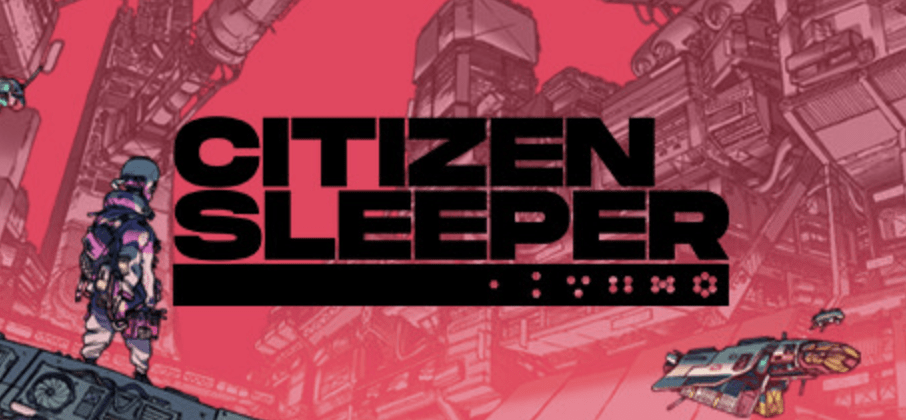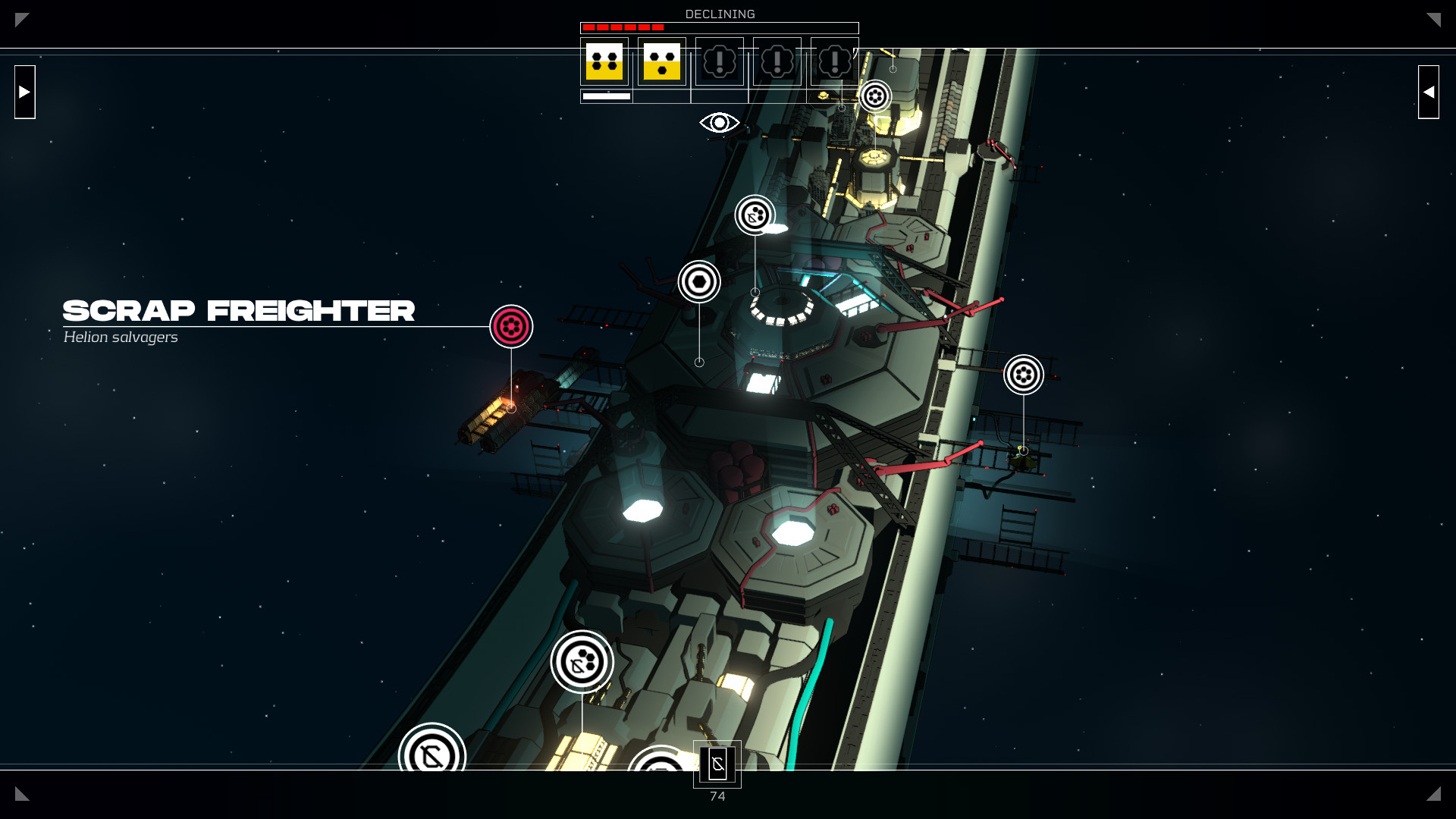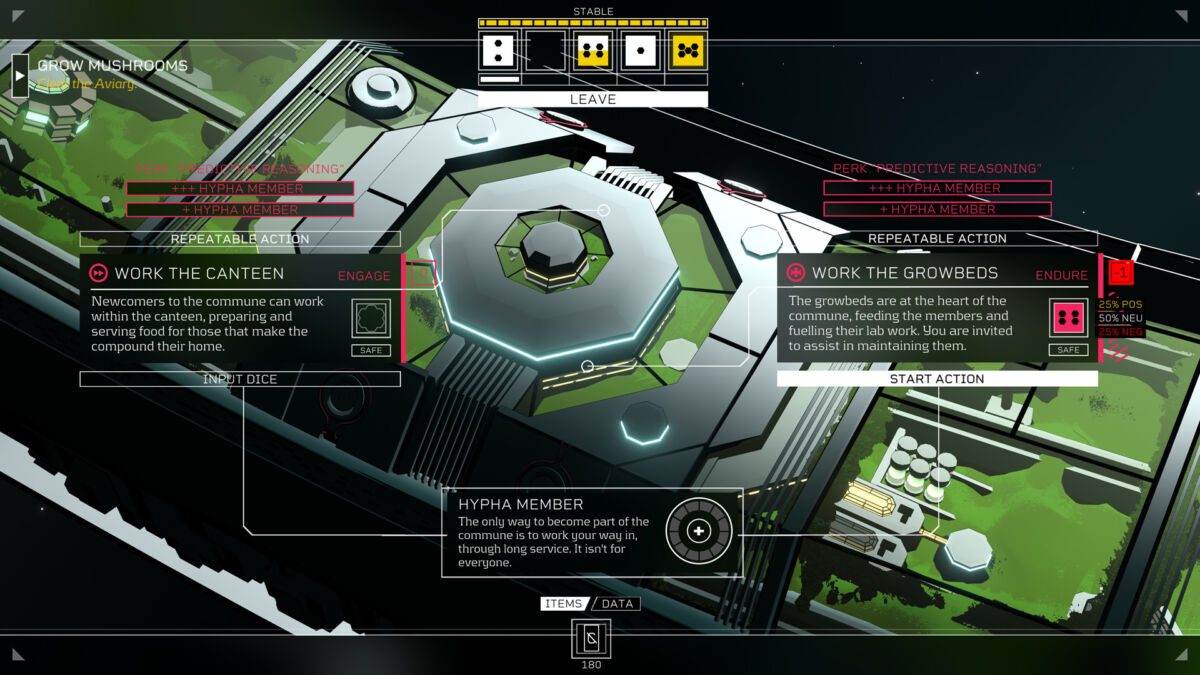
What does it mean to be human? This question is at the heart of Citizen Sleeper, a new indie masterpiece from solo developer Gareth Damian Martin, aka Jump Over the Age.
You play as the titular Sleeper, a human mind digitally inserted into an artificial body. In the game’s vision of the future, humans still have rights, but AIs are heavily regulated, making Sleepers something of a loophole that strips a mass workforce of sentient beings of all rights. Essentially, you can sell your consciousness to a megacorporation called Essen-Alp, which will implant your consciousness into a cybernetic body and use it as slave labor.
The game begins just after your escape from Essen Alp and ends with you penniless and alone in a dilapidated space station called Arlin’s Eye. A sort of floating Mos Eisley, filled with seedy bars, bounty hunters, petty criminals and sailors trying to make a living in a forgotten corner of the galaxy. You join this multitude of human flotsam trying to rebuild what’s left of your existence and hopefully find freedom.
Of course there’s a problem. Sleepers are built to go obsolete by design. Each one only lasts for 20 “cycles” (days in game terms) unless you periodically ingest the company’s serum. You’ll need to earn enough income on the black market to buy it. To make matters worse, it’s also equipped with a tracking device. These evil corporations love to protect their investments, so it’s now a race against time to escape their clutches by either disabling the tracking device or escaping the station.
If this plot sounds familiar, it’s probably because it’s been used in numerous other sci-fi novels, most notably Blade Runner. But Citizen Sleeper breathes new life into this well-worn sci-fi cliché and gives you something new to think about.
The developers describe the game as “inspired by tabletop role-playing games,” but I find it hard to categorize. It’s part resource management sim, part RPG, part visual novel, part point-and-click… well, it’s really versatile.

The majority of the game is exploring The Eye, meeting people, cooperating with some of them, hiding from others, and basically just trying to survive – literally, at any given time there, you’re never more than 20 cycles away from your own world. The robot body gives up.
Gameplay is divided into individual cycles. In each cycle you are given a set number of dice to use for tasks you need to complete on sight. Different tasks have different difficulties and require different dice values to complete. When you run out of dice you go to sleep and restart the loop for the next cycle. Stats can be improved with experience points, giving you point bonuses for certain tasks. If you’ve played any pen-and-paper role-playing games, you’ll be familiar with how the game works, and if not, it won’t take you long to get the hang of it.
Essentially the whole game is about resource management. You have to multitask while controlling your health and hunger. You never have enough dice to do everything you need to do, so the only way to succeed is to keep everything in a delicate balance. You have to work to make money, and you have to make money to stay healthy, but the more time you spend on your health, the less you can spend on other tasks.
To make matters worse, as your health decreases, you have fewer dice available to complete tasks, and it becomes harder to make enough money to stay full health… well, you already get the idea. It’s a fine line, and to be honest, I ended up screwing everything up and having to restart the game after about 2 hours because I couldn’t keep my health levels up enough to do anything. Oddly, this reminds me of city-building games like Cities: Skylines, where a misplaced sewer pipe will cause the entire city around you to collapse.
The graphics are minimalistic but functional. The entire game is seen from a bird’s-eye view of a space station, and most of the world-building is done through on-screen text, which is brilliantly written throughout. My only criticism is that the world the developers have created is so interesting that I would have liked to actually see the places you visit rather than just imagine them based on text descriptions.

I liked this game. In fact, I really liked it. But the only disappointment for me was that the decisions didn’t seem to matter as much as I thought they would, especially in a so-called RPG. You can choose your path in the game to some extent, but it’s determined by which tasks you complete and in what order, not how you interact with the other residents. And even though there are 9 different endings, the game feels like it’s on rails until you decide to quit or keep playing.
I also wish I could have been able to make moral judgments that affected the plot more than they actually did. With such a strong premise and immersive world, I want to feel like my choices actually shape the character I play. An example of this is when my character was betrayed by an NPC in the game. When we met up with him later, they apologized and offered me the money they had stolen from me. The game gave me the choice to keep the money or throw it at their feet. This seems to me like a key point that will determine your future relationship with this NPC for the rest of the game, but in reality, this decision is totally fine. No matter which choice you make, your future interactions will be the same. This actually felt more like a missed opportunity than a game-ruining issue, but it doesn’t ruin the overall experience the developer created. Maybe I’m expecting too much from a game made by a single person.
It took me about 6 hours to beat Citizen Sleeper. It’s a testament to this game that I still felt like I was in the world the developer created, even though I did almost everything there was to do. The story was as expected. I was pleasantly surprised because it was exactly what he had in mind. The post-launch roadmap already includes new content for July, October and 2023, so I’m really looking forward to the new stories they have in store for us.
Still, this title won’t be for everyone; with a ton of text to read and minimal graphics, players will mostly have to imagine the world they’re in while playing the game. But it’s a perfect example of how a game can tell a story as rich as a novel or a movie, and it’s definitely worth diving into the world of Citizen Sleeper for a few days.

Leave a Reply